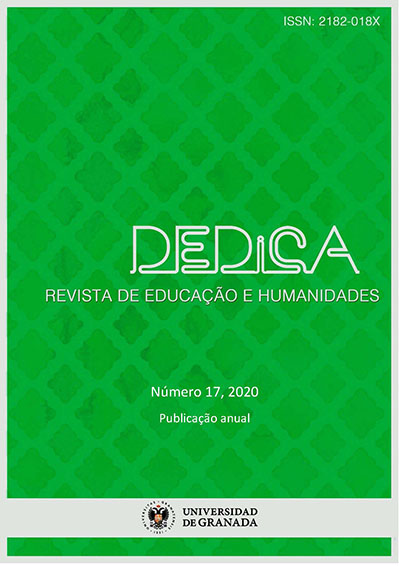Fluence of reading on the transition from 3rd to 4 rd grade
DOI:
https://doi.org/10.30827/dreh.v0i17.11352Keywords:
prosody, reading accuracy, reading fluency, speedAbstract
This study was developed at the Paião School Group, located in Figueira da Foz.
This work resulted from the monitoring of reading fluency performed in three groups of students who were evaluated in the 3rd and 4th grade.
The fluency assessment was carried out through texts not known to the student. Reading was performed individually with each child and the reading time was recorded. During the reading we pointed out the mistakes made.
We can say that, in terms of accuracy, students are reading properly. Slight progress was observed from grade 3 to grade 4, allowing to conclude that only after the child has automated the word and read accurately can he develop the dimension of expressiveness and speed.
We confirm that the evolution of these dimensions of fluency from 3rd to 4th grade is significant.
Downloads
References
Ballester, J. (2015). La formación lectora y literaria. Barcelona: Editorial Graó, de IRIF, S.L.
Buescu, H. C., Morais, J., Rocha, M. R. et al. (2012). Metas curriculares no Ensino Básico. Caderno de apoio- aprendizagem de leitura e de escrita (LE): Lisboa. DGE
Buescu, H. C., Morais, L. C., Silva, M. G. & Rocha, M. R. (2015). Programa e metas curriculares de Português- Ensino Secundário. Lisboa: Ministério da Educação e Ciência. Lisboa: Direção Geral de Inovação e Desenvolvimento Curricular.
Ferreira, A. S. (2013) (Coord.). TIMSS & PIRLS 2011 – Relações entre os desempenhos em leitura, matemática e ciências, 4.º ano: Implicações para a aprendizagem nos primeiros anos de escolaridade. Lisboa: ProjAVI, Grupo de Projeto para a Avaliação Internacional de Alunos. Disponível em http://www.dgeec.mec.pt/np4/246/
Goodman, K. (1982). Language and Literacy: The selected writings of Kenneth Goodman. Vol. I: Process, Theory, Research. Boston: Routledge & Kegan Paul.
National Reading Panel (2000). Teaching children to read: An evidence-based assessment of the scientific research literature on reading and its implications for reading instruction. National Institute of Child Health and Human Development. Disponível em: https://www.nichd.nih.gov/publications/pubs/nrp/Documents/report.pdf
Pikulski, J. J., Chard, D. J. (2005). Fluency: bridge between decoding and reading comprehension. The Reading Teacher, 58(6), 510-519. Doi: https://doi.org/10.1598/RT.58.6.2
Ramos, M. H. (2017). Das conceções linguísticas de leitura e escrita à fluência e compreensão leitora no 1.º Ciclo do Ensino Básico - Um estudo no Agrupamento de Escolas de Paião. Tese de doutoramento não publicada. Évora: Universidade de Évora, Portugal.
Rasinski, T. (2014). Fluency matters. International Electronic Journal of Elementary Education, 7(1),3-12. Disponível em: https://files.eric.ed.gov/fulltext/EJ1053609.pdf
Rasinski, T. (2009). Teaching reading fluency to struggling readers – method, materials, and evidence. Reading & Writing Quarterly. Overcoming Learning Difficulties, 25, 2-3. Disponível em: https://doi.org/10.1080/10573560802683622
Rasinski, T. (2004). Creating fluent readers. Educational leadership, 61(6), 46-51. Disponível em: http://www.ascd.org/publications/educational-leadership/mar04/vol61/num06/Creating-Fluent-Readers.aspx
Rasinski, T. & Hamman, P. (2010). Fluency: why it is “not hot”. Reading today, 28, 26. Disponível em:
http://connection.ebscohost.com/c/articles/53049038/fluency-why-is-not-hot
Sá, C. M. (2014). (org.). Transversalidade III: das palavras à ação nos primeiros anos de escolaridade. Aveiro: UA Editora Universidade de Aveiro.
Torgesen, J. K. & Hudson, R. (2006). Reading fluency: critical issues for struggling readers. In S. J. Samuels and A. Farstrup (Eds.). Reading fluency: The forgotten dimension of reading success. Disponível em http://www.fcrr.org/publications/publicationspdffiles/Fluency_chapter-Torgesen&Hudson.pdf
Viana, F. L. (2009). O Ensino da leitura: A avaliação. Lisboa: Direção-Geral de Inovação e Desenvolvimento Curricular do Ministério da Educação (DGIDC).












